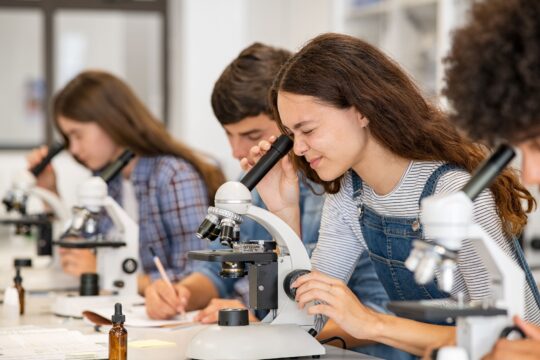What is Learning Loss?
The phrase “learning loss” typically is used to describe the phenomenon in which students tend to forget knowledge of concepts learned within a given school year. Typically, this phrase is utilized near the conclusion of the school year and beginning of the subsequent academic year in relation to students’ ability to retain information over the course of summer vacation. Those who support alternative approaches to academic calendars such as year-round school often use learning loss in the summer months as an argument to support the need for a different approach to school timelines.
Learning loss has become increasingly prominent in conversations among educators over the course of the past year as a result of the challenges brought about by the COVID-19 pandemic. Over the past year, many students were subjected to lengthy periods of time in which they received little – if any – instruction.
Additionally, many schools did not resume in-person instruction until the fourth quarter of the 2020-2021 school year. This abbreviated amount of face-to-face instructional time combined with the traditional summer break has the potential to result in students performing below their age-appropriate grade levels during the fall of 2021 and has the potential to create a “domino effect” in which the present cohort of school-aged children could see a substantial lag in their academic progress upon graduation as compared to the cohort of students who graduated high school prior to the pandemic.
How Many Students Experience Learning Loss?
Given the limitations on accurately measuring learning loss and the sheer volume of students within the United States, the actual number of students who do not retain knowledge on par with their grade levels is difficult to quantify. It is, however, safe to assume that all students, regardless of age and ability level, experience at least some degree of learning loss when not actively engaged in their academic pursuits.
This concept is evidenced in simple scenarios such as a primary-aged student who demonstrated proficiency with multiplication tables and basic math facts during the spring being unable to recall the information when called upon to incorporate those skills into learning long division in the fall of the same year following summer vacation. Another example is an eighth-grader who has displayed mastery of grammar and mechanics in the spring but is unable to recall and incorporate these basic concepts into written assignments in a ninth-grade composition class.
The degree to which students lose the ability to retain information while away from school is influenced by a number of factors. Students living in homes with little or no intrinsic support for reading and educational activities during the summer months generally tend to lose information at a faster rate than those living in homes in which reading and educational websites and television programs are encouraged. In light of the COVID-19 pandemic, a substantially larger proportion of students is at risk of severe learning loss.
What Challenges Does It Present for the Next Year?
The beginning of the 2021-2022 school year most likely will be both interesting and sobering. As instructors begin to introduce content at grade level, students’ ability to perform will be a direct indicator of how far behind they may have fallen academically. Teachers then will have the option to either forge ahead with grade level material (the wrong approach) or to back up the curriculum content to more foundational concepts and begin scaffolding from there.
Naturally, this should help students pick up where their retention has left off; however, it also creates a “trickle up effect” in which each subsequent grade level actually is instructed below level for twelve consecutive years. While this sounds rather dismal, it is better to ensure that students are able to learn at their levels as opposed to teachers simply covering material because it is what students are supposed to be able to learn and do by the time they reach a certain age.
An additional challenge is students’ performance on standardized assessments required by federal and state governments. All of our assessments were developed using pre-pandemic standards. Unfortunately, the loss of learning brought about by the pandemic most likely will result in increased underperformance on standardized assessments which either will lead to a lowering of the standards or schools being penalized unfairly as a result of circumstances that were beyond their control.
Strategies to Combat Learning Loss
Numerous theories for combatting learning loss have been offered over the years; however, there is no fail-safe approach that will automatically result in knowledge retention. Instead, it is best to incorporate academically sound approaches based in common sense that can be applied across the range of grade levels from kindergarten to grade 12. Several strategies to combat learning loss and increase retention include the following:
- Partner with parents to promote reading over the summer. For example, teachers could provide a list of eligible book titles and provide students with the opportunity to read at least three new books over the course of the summer followed by a brief book report. Students could then be incentivized to read by receiving extra credit at the beginning of the subsequent school year and also being enrolled in a drawing for a gift card to a local business or venue.
- Develop three one-week day camps for students to attend voluntarily over the summer. In this example, school districts would offer summer reading, math, and STEM camps in June, July, and August. In addition to learning and fostering knowledge retention, grant funding is available for meals and other incentives to encourage students to participate. Simply culminating each week-long camp with a water balloon battle, ice cream sundae party, or game of capture the flag is enough incentive to recruit a significant number of students.
- Partner with local libraries and universities to jointly sponsor engaging online and in-person academic challenges and contests in which students are eligible to receive trophies and other prizes sponsored by local businesses.
- Be patient and take the time to meet students at their level. While some learning loss can be attributed to a lack of initiative on the part of some students, teachers must remember that humans must crawl before they walk, and this concept applies to academics as well. In order to recover from the challenges brought about by the COVID-19 pandemic, educators must always keep students’ best interests at the forefront of their instruction.
Ultimately, we will be able to make up for the lost instruction over the course of the past year; however, intentionality on the part of teachers, parents, and communities along with significant investments of time will be needed to return to a relative state of “normalcy.”




